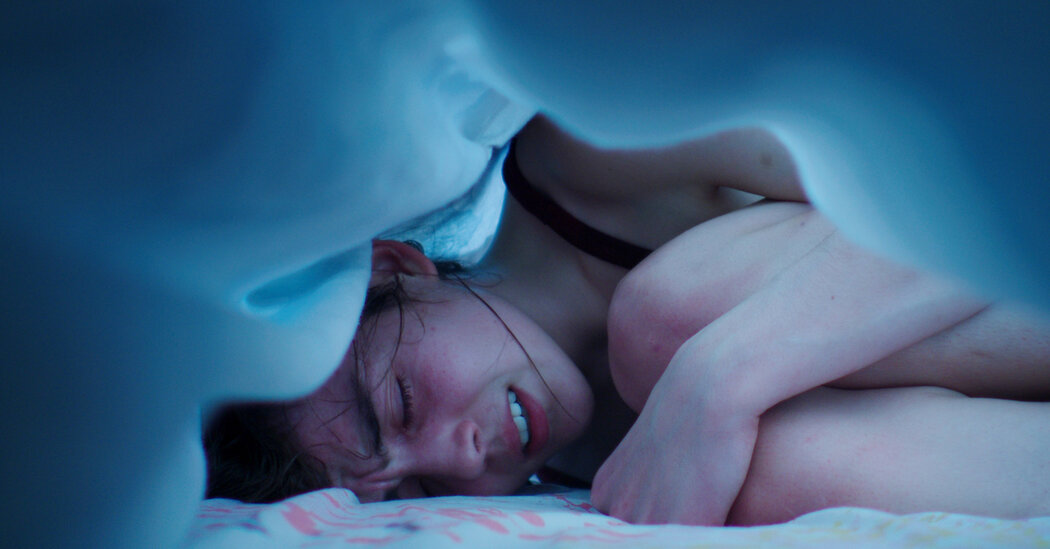
In this month’s roundup of riskier streaming recommendations, we suggest the debut film from a recent Cannes winner, a handful of indies about the complexities of modern romance, a pair of high-energy Asian action flicks and more.
‘Raw’ (2017)
With Julia Ducournau’s Palme d’Or-winning “Titane” in theaters, it’s a fine time to return to her first film, a horror sensation of the deeply unnerving sort. Garance Marillier stars as a veterinary school student and lifelong vegetarian who, when forced to eat raw offal as part of a freshman hazing, finds her appetites growing increasingly … unorthodox. Beautifully rendered and frequently stomach-churning, “Raw” showcases the filmmaker’s ability to combine body horror, eroticism, psychology and social commentary, a stew that she would bring to a full boil in her sophomore effort.
The Japanese auteur Takashi Miike isn’t exactly known for his restraint — his best-known films are the squeam-inducing “Audition” and “Ichi the Killer” — so it’s no surprise that his take on the period epic is exuberantly, unapologetically gory. But “13 Assassins” is also surprisingly respectful of the traditions of the samurai movies he’s emulating, indulging in long stretches of dialogue, motivating flashbacks and historical background. As his protagonist assembles the titular team of killers, training and strategizing, we see Miike reflecting back the “man on a mission” war and western pictures inspired by those samurai classics. But never fear; when the big climactic battle finally arrives, it’s an absolute barnburner, a 30-plus-minutes buffet of action, bloodshed and dark humor that winds things up on a satisfying note.
‘Three’ (2016)
The recent addition of the Hong Kong auteur Johnnie To to the Criterion Collection (via his 2004 film “Throw Down”) may send casual viewers hunting down his other efforts; this more recent feature is a fine showcase for his thrilling, hyperkinetic style. Set entirely in a bustling hospital ward, To puts a trio of immovable characters — a cop, a crook and a doctor — in mental and physical conflict, and invites us to watch the fireworks when they inevitably collide.
Countless movies and television series have been lifted, for a scene or two, by the indispensable character actors Shea Whigham and Michael Shannon. In Scott Teems’s adaptation of Damon Galgut’s novel, these perpetual supporting players finally get a shot at leading roles, with Whigham as a drifter and killer masquerading as a small-town preacher, and Shannon as the police chief who isn’t quite convinced. It’s pretty standard stuff, plot-wise, but Whigham and Shannon clearly relish the opportunity to bite into roles of such substance.
‘Monogamy’ (2011)
Chris Messina is a similarly valuable utility player who rarely gets to shine as a star — but he does so here, as a photographer whose upcoming nuptials to a comfortable, accepting partner (the ever-charismatic Rashida Jones) seem to drive him into a strangely obsessive, from-a-distance relationship with a comely client (Meital Dohan). The story takes some peculiar turns, yet the director and co-writer Dana Adam Shapiro anchors the film with a deft understanding of the wandering eye.
The director and co-writer Nathan Silver tells his story of sexual obsession and misunderstanding via a female protagonist, with comparably candid (and often darkly funny) results. Lindsay Burdge stars as an American flight attendant in Paris, rebounding from her partner’s suicide, who attaches herself rather disproportionately to a local bartender after a one-night stand. Burdge is terrific in the role, putting across the character’s fragility and pain without excusing her annoyances and indulgences.
‘Colette’ (2018)
It’s understandable to look upon a period literary biopic starring Keira Knightley and presume an object of arid stuffiness. But the director Wash Westmoreland gives us anything but — this is a rowdy, ribald picture, about a woman who wrote rowdy, ribald stories. She went from a shy innocent to a proud hedonist, and Westmoreland eagerly takes that journey alongside her. But he also dramatizes her intellectual awakening, and her insistence on being regarded as both a real writer and a full person.
The “Young Adult” team of the director Jason Reitman, the screenwriter Diablo Cody and the star Charlize Theron reteam for this delicate comedy-drama. Theron plays a young mother feeling the stress and exhaustion of baby care, which the filmmakers bring to life with a force so visceral, it may trigger something akin to PTSD for parents. So she brings in a “night nanny” (Mackenzie Davis) to lend a hand — and who ends up, in entertaining and occasionally shocking fashion, doing much more.
‘Maggie’s Plan’ (2016)
The writer and director Rebecca Miller assembles a cast of indie stalwarts (Greta Gerwig, Ethan Hawke, Julianne Moore) and “Saturday Night Live” favorites (Maya Rudolph, Bill Hader) for her modest riff on screwball comedies, with Gerwig as a young woman who attempts to undo her own mistaken coupling. The plotting is ingenious and the performers are at their best, both using and subverting their well-established personas, just as Miller slyly turns her film from another indie rom-com into something sharper.
The three-year friendship of the firebrand activist and the heavyweight champion has long fascinated filmmakers; fiction films like “One Night in Miami” and “Ali” dramatize it, while documentaries about both men touch on it. But their lives were so eventful that it rarely feels like more than a sidebar. Here, the director Marcus A. Clarke focuses solely on that relationship, and its implications on these two men and the world around them. In doing so, he’s able to provide the context so necessary to understanding Malcolm, Muhammad and the religion that bonded them — how they were drawn to it, and how it split them apart. Clarke tells the story crisply, intercutting the narratives, hopscotching timelines and deftly intermingling archival footage with insightful contemporary interviews.



